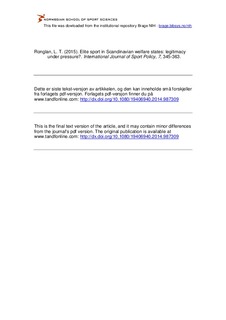| dc.contributor.author | Ronglan, Lars Tore | |
| dc.date.accessioned | 2016-08-24T11:32:34Z | |
| dc.date.available | 2016-08-24T11:32:34Z | |
| dc.date.issued | 2014-12-11 | |
| dc.identifier.citation | International Journal of Sport Policy and Politics. 2015, 7, 345-363 | nb_NO |
| dc.identifier.uri | http://hdl.handle.net/11250/2401388 | |
| dc.description | I Brage finner du siste tekst-versjon av artikkelen, og den kan inneholde ubetydelige forskjeller fra forlagets pdf-versjon. Forlagets pdf-versjon finner du på www.tandfonline.com: http://dx.doi.org/10.1080/19406940.2014.987309 / In Brage you'll find the final text version of the article, and it may contain insignificant differences from the journal's pdf version. The definitive version is available at www.tandfonline.com: http://dx.doi.org/10.1080/19406940.2014.987309 | nb_NO |
| dc.description.abstract | Taking part in the global ‘sports arming race’ is demanding to all small nations, in terms of the efforts needed to succeed at the international stage. The Scandinavian countries are wealthy and could afford (in pure economic terms) wide-ranging elite sport investments. The question put to the foreground in this paper is the legitimacy of such efforts. More specifically, the aims are to investigate and discuss (1) the societal legitimacy essential to Scandinavian elite sport’s credibility and support in general, and (2) how organizational legitimacy may be threatened by current developments aimed to strengthen international competitiveness. Based on an outline of the social democratic welfare model and the voluntary sport movements characterizing these societies, the paper emphasizes some rooted values and tensions underpinning sport in Scandinavia. Then, recent developments in the three countries’ elite sport efforts are described and discussed. Over the last decades, Scandinavian elite sports have been professionalized, extended and run in line with general international tendencies. Some of these developments challenge values fundamental to the voluntary sport model. A paradox arises: aspects that at the surface seem counterproductive to modern elite sport development; voluntarism, decentralization and local ownership to sport contribute at a deeper level substantially to elite sports’ legitimacy in this region. The paper is concluded by discussing conditions central to maintain elite sports’ social legitimacy in Scandinavia, particularly in what ways sustainable elite sport development relies on the links to the broad voluntary movement. | nb_NO |
| dc.language.iso | eng | nb_NO |
| dc.publisher | Routledge | nb_NO |
| dc.subject | social legitimacy | nb_NO |
| dc.subject | elite sport | nb_NO |
| dc.subject | mass sport | nb_NO |
| dc.subject | voluntary movement | nb_NO |
| dc.subject | welfare state | nb_NO |
| dc.title | Elite sport in scandinavian welfare states: legitimacy under pressure? | nb_NO |
| dc.type | Journal article | nb_NO |
| dc.type | Peer reviewed | nb_NO |
| dc.subject.nsi | VDP::Social science: 200 | nb_NO |
| dc.subject.nsi | VDP::Social science: 200::Political science and organizational theory: 240 | nb_NO |
| dc.source.journal | International Journal of Sport Policy and Politics | nb_NO |
| dc.identifier.doi | 10.1080/19406940.2014.987309 | |
| dc.description.localcode | Seksjon for kultur og samfunn / Department of Cultural and Social Studies | nb_NO |
